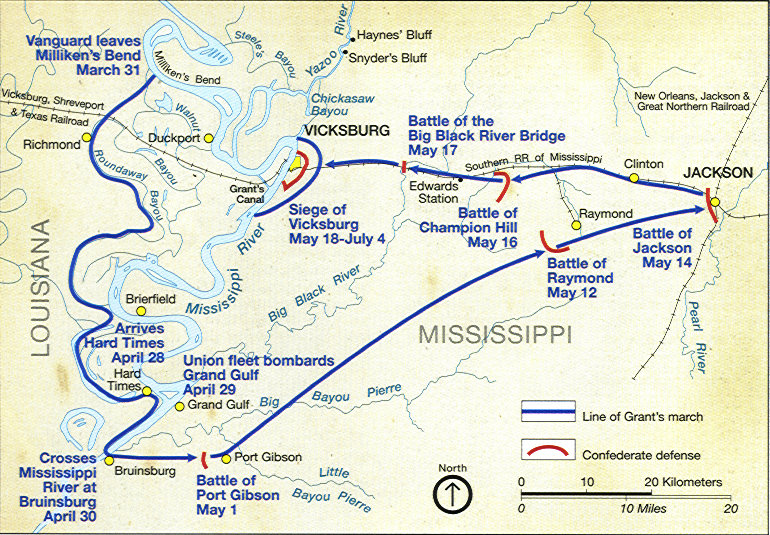Chapter 21: Long Remember: The Summer of '63
Grant was confident he would get food for his soldiers even as people around him starved. After what happened when his supplies were destroyed, he decided to travel light and live off the land. Many regiments just looted supplies and food to survive.
On July 4, 1863, the Confederacy went away from Gettysburg, and in Mississippi, Union troops captured Vicksburg. This was the most important northern strategic victory; Grant believed the Confederacy fell because of this victory. But, the Union, McPherson claims, won the war because of its many victories in the West, since the Confederacy came close to winning in the East.
Joe Hooker didn't use his troops as efficiently during the battle, but the Chancellorsville battle, which the Confederates won, cost them. About a third of their forces were killed and Stonewall Jackson died. The boost in morale that followed after this battle for the Confederates actually proved to be bad; many of them believed too much in their abilities and a hatred against the Unionists and believed they couldn't be defeated.
Longstreet then ordered the attack on the Union line at Gettysburg since it seemed the Confederates thought they had disabled the Union's weaponry. Pickett's charge represented the Confederate war effort, McPherson claims; they seemed to have a deep sense of identity and pride; they were brave and it would like they were winning, but eventually they only lost.
The Union weapons had not been destroyed; the Union forces were merely hiding and when they counterattacked, the Confederates collapsed. Although they breached the first Union line, many were killed. Of the 14,000 Confederates that began at the beginning of the battle, less than half returned.
Southern morale was completely crushed; still, the Union suffered many casualties at Gettysburg and even more Confederates were killed. Lee was depressed by the outcome of his campaign and offered his resignation.
Though the war continued for two more years, Gettysburg and Vicksburg proved to have been the final turning point. (This is actually really interesting, since I thought Gettysburg and Vicksburg happened and then the war just ended, though that wouldn't make sense since the war only ended in 1865.)
Grant was confident he would get food for his soldiers even as people around him starved. After what happened when his supplies were destroyed, he decided to travel light and live off the land. Many regiments just looted supplies and food to survive.
On July 4, 1863, the Confederacy went away from Gettysburg, and in Mississippi, Union troops captured Vicksburg. This was the most important northern strategic victory; Grant believed the Confederacy fell because of this victory. But, the Union, McPherson claims, won the war because of its many victories in the West, since the Confederacy came close to winning in the East.
Joe Hooker didn't use his troops as efficiently during the battle, but the Chancellorsville battle, which the Confederates won, cost them. About a third of their forces were killed and Stonewall Jackson died. The boost in morale that followed after this battle for the Confederates actually proved to be bad; many of them believed too much in their abilities and a hatred against the Unionists and believed they couldn't be defeated.
Longstreet then ordered the attack on the Union line at Gettysburg since it seemed the Confederates thought they had disabled the Union's weaponry. Pickett's charge represented the Confederate war effort, McPherson claims; they seemed to have a deep sense of identity and pride; they were brave and it would like they were winning, but eventually they only lost.
The Union weapons had not been destroyed; the Union forces were merely hiding and when they counterattacked, the Confederates collapsed. Although they breached the first Union line, many were killed. Of the 14,000 Confederates that began at the beginning of the battle, less than half returned.
Southern morale was completely crushed; still, the Union suffered many casualties at Gettysburg and even more Confederates were killed. Lee was depressed by the outcome of his campaign and offered his resignation.
Though the war continued for two more years, Gettysburg and Vicksburg proved to have been the final turning point. (This is actually really interesting, since I thought Gettysburg and Vicksburg happened and then the war just ended, though that wouldn't make sense since the war only ended in 1865.)
Key Terms:
- Battle at Vicksburg: Grant led Union forces and defeated two Confederate armies and destroyed the city; soon, he had complete control over the Mississippi River.
- Battle at Gettysburg: an incredibly bloody battle with many casualties; Lincoln was furious, but it was a major victory for the Union.
Questions:
- Why was Lincoln so angry about the Battle at Gettysburg? The book didn't really explain this.
- Did the natives play any sort of part in the Civil War? It feels like they've completely disappeared, though they must be there in some numbers in the West.
Citations:
- McPherson,
James M. "21: Long Remember: The Summer of '63." In Battle Cry of
Freedom, 626-665. Oxford: Oxford University Press, 1988.
- Accessed March 11, 2015. http://thomaslegion.net/sitebuildercontent/sitebuilderpictures/siegeofvicksburgcampaign.jpg.

No comments:
Post a Comment